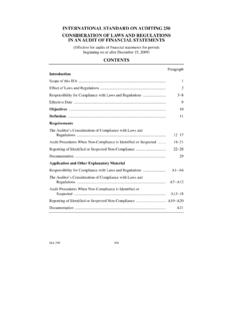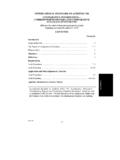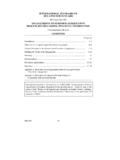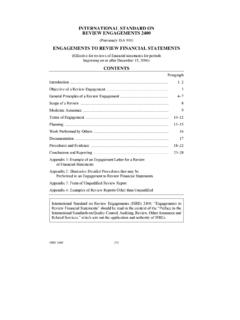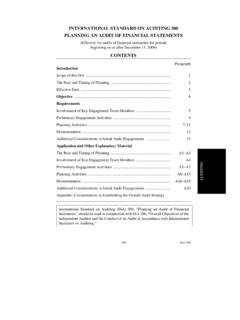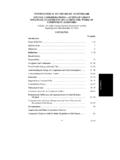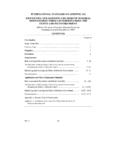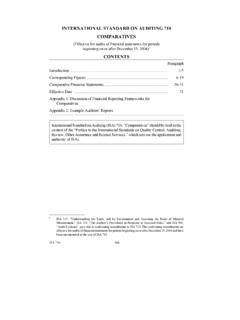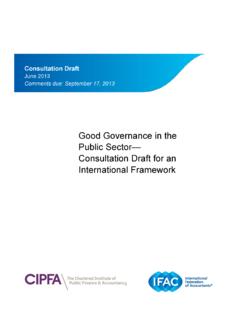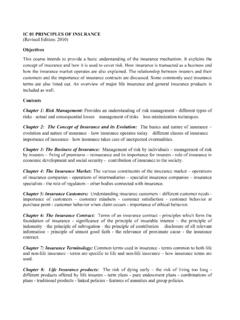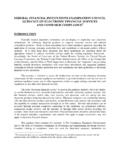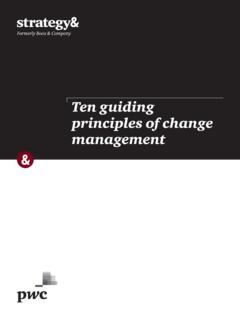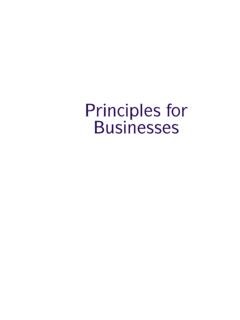Transcription of Evaluating and Improving Corporate Governance in …
1 International Good Practice Guidance February 2009 International Good Practice Guidance Evaluating and Improving Governance in Organizations 2 The Professional Accountants in Business (PAIB) Committee of the International Federation of Accountants (IFAC) approved this International Good Practice Guidance, Evaluating and Improving Governance in Organizations, for publication in February 2009. The PAIB Committee welcomes your feedback on this document. Comments should be addressed to: Professional Accountants in Business Committee International Federation of Accountants 545 Fifth Avenue, 14th Floor. New York, New York 10017 USA Email comments should be sent to: The mission of the International Federation of Accountants (IFAC) is to serve the public interest, strengthen the worldwide accountancy profession and contribute to the development of strong international economies by establishing and promoting adherence to high-quality professional standards, furthering the international convergence of such standards and speaking out on public interest issues where the profession s expertise is most relevant.
2 This publication was prepared by IFAC s PAIB Committee which serves IFAC member bodies and the more than one million professional accountants worldwide who work in commerce, industry, the public sector, education, and the not-for-profit sector. Its aim is to enhance the role of professional accountants in business by encouraging and facilitating the global development and exchange of knowledge and best practices. This publication may be downloaded free-of-charge from the IFAC website at The approved text is published in the English language. Copyright February 2009 by the International Federation of Accountants (IFAC).
3 All rights reserved. Permission is granted to make copies of this work provided that such copies are for use in academic classrooms or for personal use and are not sold or disseminated and provided that each copy bears the following credit line: Copyright February 2009 by the International Federation of Accountants (IFAC). All rights reserved. Used with permission of IFAC. Contact for permission to reproduce, store or transmit this document. Otherwise, written permission from IFAC is required to reproduce, store or transmit, or to make other similar uses of, this document, except as permitted by law.
4 Contact ISBN: 978-1-934779-88-0 3 Preface to IFAC's International Good Practice Guidance A separate document, entitled Preface to IFAC s International Good Practice Guidance, sets out the scope, purpose, and due process of the PAIB Committee s International Good Practice Guidance series to which this guidance paper on Governance belongs. It can be downloaded free-of-charge from the PAIB section of the IFAC online bookstore at 4 IFAC PAIB COMMITTEE INTERNATIONAL GOOD PRACTICE GUIDANCE Evaluating AND Improving Governance IN ORGANIZATIONS CONTENTS Page Evaluating and Improving Governance In Organizations .. 5 1. Why the Topic is Important.
5 5 The Role of the Professional Accountant in Business .. 5 2. Definitions, Framework, and Key principles that are Widely Accepted Features of Good Practice .. 6 Governance Definitions in the Context of this IGPG .. 6 Governance Framework .. 8 The Key principles of Evaluating and Improving Governance in Organizations .. 10 3. Practical Guidance on Implementing the principles .. 11 Appendix A: Examples of Organizational Values/ principles .. 20 Appendix B: Resources .. 22 Appendix C: The Diversity of Governance Structures .. 24 Evaluating AND Improving Governance IN ORGANIZATIONS 5 Evaluating and Improving Governance in Organizations 1.
6 Why the Topic is Important This International Good Practice Guidance (IGPG) provides a framework and principles -based guidance for the professional accountant in business and their organizations on Evaluating and Improving Governance in organizations. Recognizing that varied organizations and cultures take different approaches to Governance , this guidance is based on the premise that certain factors and behaviors can lead to better outcomes and increased stakeholder value across all entities. Some form of Governance has always been present in organizations, but the attention paid to Governance issues has evolved with changes in the business environment.
7 Due to recent Corporate failures and regulatory responses, Governance has again become a priority. Various Governance codes have been proposed and implemented on both national and international levels; see Appendix B for some examples. Although most organizations have a Governance structure in place, it is often focused on conformance with regulations. This conformance is of course necessary, but a Governance structure should also support an organization s efforts to improve performance. The intention of this IGPG is to help create a balance between performance and conformance, as described in the framework below.
8 Successful organizations adhere to Governance principles , and periodically evaluate results to ensure the continuing effectiveness of their Governance systems. Furthermore, Governance procedures and practices should be benchmarked against those of successful organizations and the principles outlined in this IGPG. As organizations and their environments change, the Governance system must adapt to future opportunities and threats by Improving processes and practices. The Role of the Professional Accountant in Business As reported in IFAC s 2005 information paper, The Roles and Domain of the Professional Accountant in Business, the domain of the professional accountant in business includes among other things the following activities: 1.
9 Providing, analyzing and interpreting information to management for formulation of strategy, planning, decision-making and control. 2. Measuring performance, recording financial transactions typically under national or international generally accepted accounting principles and communicating the results to board and stakeholders. 3. Managing risk, and providing internal control and business assurance. 4. Generating or creating value through the effective use of resources ( financial or otherwise) through (a) understanding the drivers of value to stakeholders (which may include shareholders, customers, employees, suppliers, communities, and government), and (b) organizational innovation.
10 Evaluating AND Improving Governance IN ORGANIZATIONS 6 These activities, in which the professional accountant in business is engaged, are strongly aligned with the activities included in the definition of Governance (see below): (a) providing strategic direction, (b) ensuring objectives are achieved, (c) ascertaining that risks are managed, and (d) verifying the responsible use of resources. The professional accountant in business has a responsibility in all of these activities to ensure that the organization engages in effective and efficient practices. The professional accountant in business has a responsibility to provide objective and valid information and analyses to support all of these activities and, in some cases, may have overall responsibility in areas such as risk management and resource allocation.
